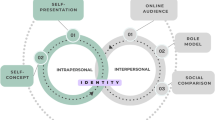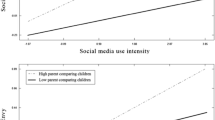Abstract
This study examined whether the nominal personalization of a storybook about sharing impacted preschool-aged children’s perceived similarity with the main character or their likelihood of comprehending the moral lesson and applying it to their own behavior. Children were read either a personalized story about sharing, a non-personalized story about sharing, or a control story not about sharing. Perceived similarity with the main character was measured by participants’ self-references produced during a story retelling task, comprehension was measured through retelling and open-ended questions, and participants’ prosocial behavior was measured with a sticker sharing task both prior to and following the story reading. The amount of spontaneous speech produced by the participant during the storybook reading was also measured to gauge whether children’s engagement with and understanding of the story was affected by storybook type. Results showed that nominally personalized books did not encourage greater comprehension or more sharing behavior than the other two types of books, though both stories with a sharing moral did elicit more detailed retellings than the control story. These results suggest that books with nominal personalization do not necessarily help children understand the moral of a story and apply it to their own lives. Limitations to these findings and avenues for future research on the degree and type of personalization that may be effective for promoting prosocial behaviors in preschoolers are discussed.

Similar content being viewed by others
Notes
Santa Clara county demographics: 54% White, 26% Asian or Pacific Islander, 3% African American, < 1% Native American, 17% other or more than 1 race and, 24% Hispanic or Latinx.
References
Buttelmann, D., Zmyj, N., Daum, M., & Carpenter, M. (2013). Selective imitation of in-group over out-group members in 14-month-old infants. Child Development, 84(2), 422–428.
Cingel, D. P., & Krcmar, M. (2019). Prosocial television, preschool children’s moral judgments, and moral reasoning: The role of social moral intuitions and perspective-taking. Communication Research, 46(3), 355–374. https://doi.org/10.1177/0093650217733846.
Dickinson, D. K., Golinkoff, R. M., & Hirsh-Pasek, K. (2010). Speaking out for language: Why language is central to reading development. Educational Researcher, 39(4), 305–310. https://doi.org/10.3102/0013189X10370204.
Dickinson, D. K., Nesbitt, K. T., Collins, M. F., Hadley, E. B., Newman, K., Rivera, B. L., et al. (2019). Teaching for breadth and depth of vocabulary knowledge: Learning from explicit and implicit instruction and the storybook texts. Early Childhood Research Quarterly, 47, 341–356. https://doi.org/10.1016/j.ecresq.2018.07.012.
Dore, R., Hassinger-Das, B., Brezack, N., Valladares, T., Paller, A., Vu, L., et al. (2018). The parent advantage in fostering children’s e-book comprehension. Early Childhood Research Quarterly, 44, 24–33.
Flack, Z. M., Field, A. P., & Horst, J. S. (2018). The effects of shared storybook reading on word learning: A meta-analysis. Developmental Psychology, 54(7), 1334–1346. https://doi.org/10.1037/dev0000512.
Ganea, P. A., Pickard, M. B., & DeLoache, J. S. (2008). Transfer between picture books and the real world by very young children. Journal of Cognition and Development, 9, 46–66. https://doi.org/10.1080/15248370701836592.
Gibbons, J., Anderson, D. R., Smith, R., Field, D. E., & Fischer, C. (1986). Young children’s recall and reconstruction of audio and audiovisual narratives. Child Development, 57(4), 1014–1023.
Greenhoot, A. F., Beyer, A. M., & Curtis, J. (2014). More than pretty pictures? How illustrations affect parent–child story reading and children’s story recall. Frontiers in Psychology, 5, 738.
Kotaman, H., & Balci, A. (2017). Impact of storybook type on kindergartners’ storybook comprehension. Early Child Development and Care, 187, 1771–1781. https://doi.org/10.1080/03004430.2016.1188297.
Kucirkova, N., Messer, D., & Sheehy, K. (2014a). Reading personalized books with preschool children enhances their word acquisition. First Language, 34(3), 227–243. https://doi.org/10.1177/0142723714534221.
Kucirkova, N., Messer, D., & Sheehy, K. (2014b). The effects of personalisation on young children’s spontaneous speech during shared book reading. Journal of Pragmatics, 71, 45–55. https://doi.org/10.1016/j.pragma.2014.07.007.
Kucirkova, N., Messer, D., & Whitelock, D. (2010). Sharing personalized books: A practical solution to the challenges posed by home book reading interventions. Literacy Information and Computer Education Journal, 1, 263–272.
Larsen, N. E., Lee, K., & Ganea, P. A. (2018). Do storybooks with anthropomorphized animal characters promote prosocial behaviors in young children? Developmental Science, 21(3), 1–9. https://doi.org/10.1111/desc.12590.
Malti, T., Gummerum, M., Ongley, S., Chaparro, M., Nola, M., & Bae, N. Y. (2016). “Who is worthy of my generosity?” Recipient characteristics and the development of children’s sharing. International Journal of Behavioral Development, 40, 31–40. https://doi.org/10.1177/0165025414567007.
Mares, M. L., & Acosta, E. E. (2008). Be kind to three-legged dogs: Children’s literal interpretations of TV’s moral lessons. Media Psychology, 11, 377–399. https://doi.org/10.1080/15213260802204355.
Mares, M. L., Bonus, J. A., & Peebles, A. (2018). Love or comprehension? Exploring strategies for children’s prosocial media effects. Communication Research. https://doi.org/10.1177/0093650218797411.
Moore, C. (2006). The development of commonsense psychology. London: Psychology Press.
Pinkham, A. M., Kaefer, T., & Neuman, S. B. (2014). Taxonomies support preschoolers’ knowledge acquisition from storybooks. Child Development Research. https://doi.org/10.1155/2014/386762.
Read, K. (2019). Parent survey of children's responses to storybook features. Unpublished data.
Richert, R. A., Shawber, A. B., Hoffman, R. E., & Taylor, M. (2009). Learning from fantasy and real characters in preschool and kindergarten. Journal of Cognitive Development, 10, 41–66. https://doi.org/10.1080/15248370902966594.
Strouse, G. A., Nyhout, A., & Ganea, P. A. (2018). The role of book features in young children’s transfer of information from picture books to real-world contexts. Frontiers in Psychology, 9, 50. https://doi.org/10.3389/fpsyg.2018.00050.
Zmyj, N., Aschersleben, G., Prinz, W., & Daum, M. (2012). The peer model advantage in infants’ imitation of familiar gestures performed by differently aged models. Frontiers in Psychology, 3, 252.
Acknowledgements
This research was not financially supported, but we are indebted to the many children and parents who freely volunteered and participated in this study and the partnerships of Bright Starz, Temple Emanu-El, and Kids on Campus Preschool at Santa Clara University. We would also like to acknowledge the help and feedback received from the Read Lab.
Author information
Authors and Affiliations
Corresponding author
Additional information
Publisher's Note
Springer Nature remains neutral with regard to jurisdictional claims in published maps and institutional affiliations.
Rights and permissions
About this article
Cite this article
Kruse, E., Faller, I. & Read, K. Can Reading Personalized Storybooks to Children Increase Their Prosocial Behavior?. Early Childhood Educ J 49, 273–282 (2021). https://doi.org/10.1007/s10643-020-01069-x
Published:
Issue Date:
DOI: https://doi.org/10.1007/s10643-020-01069-x




